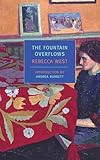“You must always believe life is as extraordinary as music says it is,” says the mother to her daughter Rose, the child narrator of Rebecca West’s The Fountain Overflows. Upon finishing the book, I bought a copy for a friend and told two more friends about it.
 The novel is populated with musicians enabled and disabled by music. Rose’s mother is a concert pianist who has left the stage too early for a family life for which she is ill-prepared; Rose and her twin sister and their little brother are born musicians; however, it is their elder sister who, with neither talent nor taste but a willfulness to make herself a famous violinist, asks a question that can be their mother’s match. “What’s the harm in cancer if there is all this music in the world?”
The novel is populated with musicians enabled and disabled by music. Rose’s mother is a concert pianist who has left the stage too early for a family life for which she is ill-prepared; Rose and her twin sister and their little brother are born musicians; however, it is their elder sister who, with neither talent nor taste but a willfulness to make herself a famous violinist, asks a question that can be their mother’s match. “What’s the harm in cancer if there is all this music in the world?”
It’s not music alone that plaques the characters in the novel. Rose’s father, a great writer of political ideas and a poor reader of human relations, walks off when his words no longer sustain him, leaving behind him friends whose betrayed and hurt feelings have to be appeased by his abandoned wife. Interestingly, it’s a young cousin of Rose, who is entirely tone-deaf, who points out to Rose at a house party that the piano there is tuned: it takes someone without any sense of music to hear what’s beyond the notes.
“What a gamble it is to raise children,” Rose’s mother claims at one point, but she might as well say: “What a gamble it is to live.” And these characters are good gamblers, and each has lived an extraordinary life as Rebecca West says it is.
More from A Year in Reading 2014
Don’t miss: A Year in Reading 2013, 2012, 2011, 2010, 2009, 2008, 2007, 2006, 2005
The good stuff: The Millions’ Notable articles
The motherlode: The Millions’ Books and Reviews
Like what you see? Learn about 5 insanely easy ways to Support The Millions, and follow The Millions on Twitter, Facebook, Tumblr.










